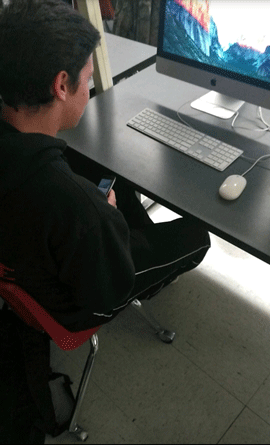WCHS bans cell phones, earbuds

Students at WCHS are against the new cell phone policy. The rule banned cellphones during class and headphones altogether.
Nov 4, 2016
WCHS students are facing new policies that aim to curb cell phone usage, and ban headphone/earbud use completely. The new rule, effective the beginning of the 2016-2017 school year, is replacing the old BYOD policy, which allowed students to use their cell phones and other electronic devices throughout the day for educational purposes.
According to assistant principal Mr. Brad Thobe, the rules changed from last school year because the administration didn’t feel cell phones were being used for the intended purpose, which was education. “Students were just on their phones nonstop,” said Mr. Thobe. He also added that every teacher’s rules for cell phone use was different, so there wasn’t much consistency. This was a problem because students would get in trouble for using their phones in one class, when they have another teacher that doesn’t mind it. While some students may argue that they often used their phones in class for educational purposes, the majority did not. Mr. Thobe said the reason earbuds and headphones were banned completely is because students can’t hear teachers or administrators tell them to take their hoods down or to stop running in the halls, so it just made more sense to ban them completely.
When 50 randomly-chosen WCHS students were asked at lunch how they felt about the new tech policies, all 50 said they were against the new policies and a number of them had good reasons.
Sophomore Michael Lacey said the new cell phone rule is “not necessarily good to have because we’re extremely reliant on technology.” Lacey also pointed out that using a cell phone for small tasks is more convenient because students aren’t always near a dictionary or a calculator.
Other schools do take advantage of the tools available on today’s smartphones. According to the Boston Globe’s article “Cell Phones: Teaching Tool or Distraction?” science students at Melrose High School use a physics app to collect data and measure sound intensities and English students discuss literature on their phones.
Sophomore Malachi Ledford said he isn’t happy about the earbud rule because he likes to listen to music while he works independently. Several other students agreed or said something to the same effect.
Junior Sophia Massie said the cell phone rules make things especially difficult because she relies on her parent to take her home due to lack of busing, to stay in contact with her parent throughout the day.
Mr. Thobe said he doesn’t believe the new rule will have a negative effect on students digital literacy because according to the results from a poll at the end of the year last year, most teachers used other electronic devices for lessons, such as the Chromebooks, computers in the IVDL, the LMC, and others the school has to has to offer.
Whether you’re for or against these new policies, both sides make good points about why we should or should not allow cell phones and headphones. If you want to make a change, you could always email a letter to the administration, or start a petition on Facebook or Twitter. Just be sure you don’t do it during class.

Noah Dugan • Mar 2, 2017 at 5:42 pm
Hello WCHS,It is I, Noah,Freshman At WCHS,I Think that the Cellphone and Earbud Rule is Not Right to be banned,They should Let us have cellphones and Earbuds,As Soon to be Class President,I Say that The Cellphone and Earbus rule is Unbanned when I become class president,And the Dress code is not banned either.
And As Class President Soon,I Say for My inauguration Speech,That We should also bring back Prom,Winter Dances,And Homecoming events.
-Signed Soon to be Class President of WCHS,Noah.
#VoteForMeAsClassPresidentOfWCHS